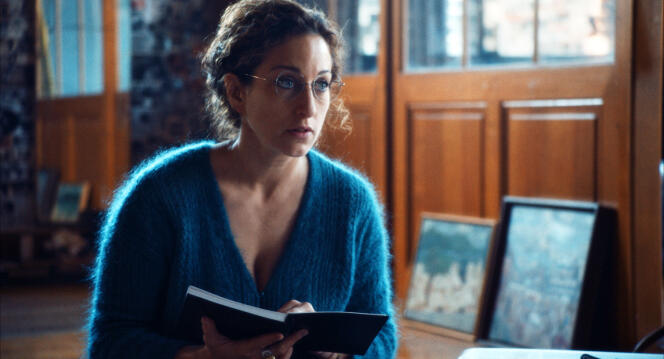In the apartment of director Mona Achache, on the top floor of a building in the Nation district in Paris, the green plants give the impression of a welcoming greenhouse. A big cat purrs on a low chair, it’s nice. The 42-year-old director, mother of three children (two daughters aged 22 and 17, and a 9-year-old son), has spent a lifetime putting at distance a childhood and a family history marked by trauma and a certain artistic perversion .
She tells this story in Little Girl Blue (November 15 in theaters), an experimental and endearing film, at the intersection of psychoanalysis, documentary and fiction. Using photographic and audiovisual archives found following the death, in 2016, of her mother and fragments of her own memory, Mona Achache lays out her “need to understand”. Understand what made her mother, Carole Achache, so unhappy, why her grandmother, Monique Lange, chose to deliver her very young daughter into the hands of her great friend Jean Genet, who “broke”and how great artists can also be such brutal human beings.
When Mona Achache talks about the death of her mother, she says: “She committed suicide in 2016, a year before #metoo. » Before Vanessa Springora and Camille Kouchner spoke like an open book, Carole Achache had also written a book, Daughter of (Stock, 2009), recounted his childhood with his mother. Employed at Gallimard, herself an author, Monique Lange loved artists. She received them and cajoled them, sought their friendship, stimulated their creativity. Violette Leduc, Albert Camus, Marguerite Duras, Florence Malraux, Jacques Rouffio, Claude Sautet and Jorge Semprún were his close friends. She co-signed screenplays for Roberto Rossellini, Joseph Losey and Henri-Georges Clouzot, and adored Jean Genet all her life, to the point of allowing him to get too close to her only daughter.
Abuses that passed for guarantees of freedom
“Around 11, 12 years old, my mother became a young woman, but remained androgynous enough to be able to interest Jean Genet and his lover at the time, explains Mona Achache. My grandmother took absolute pride in the idea of her daughter being the chosen one of this great homosexual writer whom she adored. » “Elected”, young Carole finds herself “manipulated, pushed to its limits” by the author of Notre-Dame-des-Fleurs (1943). Praising the sublime of a life on the margins, he exerts a deadly hold on her: at 18, Carole leaves for New York, where she prostitutes herself for a time, tastes drugs, rubs shoulders with the abyss. When, back in Paris, she sets out to save herself and puts on the costume of wife and mother, Jean Genet sabers her: “You are trivializing yourself”, he wrote to her in a letter.
You have 50% of this article left to read. The rest is reserved for subscribers.
